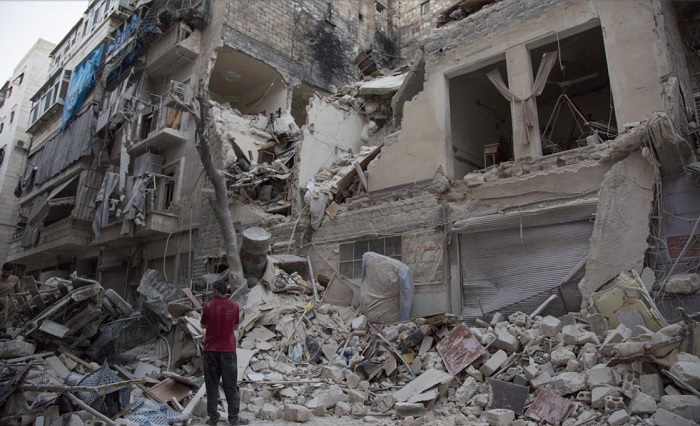
Geneva, Switzerland | AFP |
A suicide assault which killed dozens in Syria Saturday dealt a further blow to already sputtering UN efforts to launch a new round of talks to end the six-year conflict.
The Damascus regime vowed retaliation for the assault in Syria’s third city Homs — and demanded a clear condemnation from opposition negotiators in Geneva, saying otherwise it would consider them “accomplices of terrorism”.
“What happened today will not go unnoticed and we will react to it … The blood of Syrians is precious and those who kill Syrians will also be punished,” said Syria’s chief negotiator Bashar al-Jaafari.
“Any party who refuses to condemn these attacks today we will consider that party to be an accomplice of terrorism,” he added after his latest meeting with UN mediator Staffan de Mistura.
A short time later, the main opposition High Negotiations Committee (HNC) reacted to the Homs attack, although there was no immediate word from two other opposition groups in Geneva, from Moscow and Cairo.
“Our positions are clear in condemning terrorism and terrorists, we condemn Daesh and Nusra,” said HNC chief negotiator Nasr al-Hariri, using the Arabic term for the Islamic State (IS) group, and the Al-Nusra Front.
– Intelligence chief killed –
The blasts targeting two security service bases in Homs killed a top intelligence chief and close confidant of President Bashar al-Assad, and were claimed by former Al-Qaeda affiliate Fateh al-Sham Front.
The Syrian Observatory for Human Rights said in all 42 people were killed, but the provincial governor put the figure at 30 dead.
The Homs attacks came a day after 77 people, mostly civilians, were killed in a suicide bombing claimed by the Islamic State group in Al-Bab, said the Observatory. The jihadists were ousted from the northern town this week by Turkish-backed rebels.
– ‘At least six attackers’ –
Saturday’s Homs attack saw bombers targeting the headquarters of state security and military intelligence in a spectacular assault that killed General Hassan Daabul, a top military intelligence official.
“There were at least six attackers and several of them blew themselves up near the headquarters of state security and military intelligence,” Observatory director Rami Abdel Rahman said.
Fateh al-Sham Front said just five militants took part in the assault, the latest atrocity in a six-year war which has killed more than 310,000 people.
Security forces locked down the city centre after the bombings.
Homs has been under near full government control since May 2014 when rebels withdrew from the centre under a UN-brokered truce deal. But it has seen repeated bombings since, including twin attacks last year that killed 64.
The Observatory said that regime air strikes on Saturday also killed 13 civilians across the country, including three in the last rebel enclave of Homs, the Waer neighbourhood.
Like its jihadist rival IS, Fateh al-Sham is not party to a ceasefire between government forces and rebel groups taking part in the UN talks.
– Blast aimed to ‘spoil’ talks –
In Geneva, de Mistura said Saturday’s suicide attacks were clearly designed to “spoil” the peace talks. Asked if they would affect the talks, he said: “I hope not, but it was tragic.”
“Every time we are having talks or negotiations there is always someone who tries to spoil. We were expecting that,” he added.
During three previous rounds of talks in Geneva last year, the rivals never sat down at the same table, instead leaving de Mistura to shuttle between them.
The main opposition HNC wants to meet the government face-to-face this time — but has struggled to agree a united front with the Cairo and Moscow groups.
The Syrian regime envoy, after demanding all opposition groups in Geneva condemn the Homs assault, said he did not have “any preconditions,” for the talks.
But he then added: “We have only one condition and that is that we can sit with one unified patriotic opposition who we can consider as a full partner.
– Deadlocked talks –
Syria’s opposition is in a much weaker position compared to the last round of UN-brokered talks in April 2016, notably after losing their stronghold in eastern Aleppo.
Despite the setbacks on the ground, the HNC still insists that Assad leave power. Damascus says the president’s future is not up for discussion.
For the UN, the talks are about “political transition”, a term contained in Security Council resolution 2254 that provides the framework for the peace process.
“Transition means transferring the authorities to a transitional governance body,” opposition negotiator Basma Kodmani said Friday, specifying that in this body “there is no role for Bashar al-Assad”.
Rescue workers from Syria’s White Helmets group — the subject of an Oscar-nominated documentary — said they will not attend this weekend’s Academy Awards due to intensified regime bombing
 The Independent Uganda: You get the Truth we Pay the Price
The Independent Uganda: You get the Truth we Pay the Price





